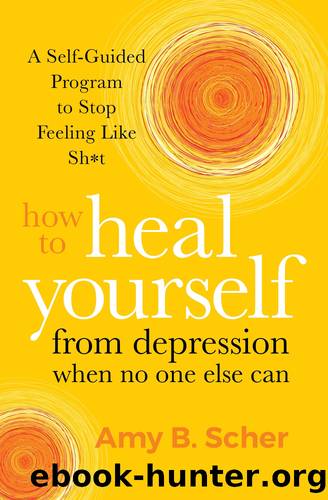How to Heal Yourself from Depression When No One Else Can by Amy B. Scher

Author:Amy B. Scher [B. Scher, Amy]
Language: eng
Format: epub
ISBN: 9781683646211
Publisher: Sounds True
How Trauma Happens
Because of how much our modern lifestyles require of us (and how we require so much of ourselves), our system often canât distinguish between stress from an actual threat and stress from past unresolved emotional experiences. It just detects âstressâ and reacts accordingly. Trauma happens when we go through certain experiences in our lives and are not able to process and let go of them. Trauma can be linked to âbigâ events as well as to events that seem meaningless or âsmallââyet still had a negative impact on you. The common denominator in trauma is that you have not processed and let go of your emotions surrounding the event. I call these events unprocessed experiences. These are snapshots of time, or memories, such as âwhen Dad diedâ or âthat time Mom forgot me at school.â Experiences are essentially memories that get stored in the body as feelings, âmovies,â or images. I see trauma as the emotional energy from any experience that is unresolved within yourselfâin other words, unfinished with your mind, body, or spirit. Itâs super important to know that not every seemingly traumatic experience will traumatize you (which weâll talk more about soon). In fact, hereâs the thing: the majority of experiences that I see contribute to depression are experiences that people have not yet addressed or talked about, because they seemed âtoo smallâ or âsillyâ to negatively affect them. While we tend to share big traumas and get help to find peace around them, the smaller or unimportant things get neglected and stuck in our bodies, affecting our entire lives. In fact, experiences that seem more âminorâ in the big picture of lifeâfrom witnessing a fight between your parents to being teased in kindergartenâcan actually be more traumatizing than the biggies because of our dismissal of them. In addition, trauma often occurs not because of the gravity of the situation or event itself, but because it happens at an age or time when we donât possess the mental and emotional capacity, or have appropriate skills, to deal with it.
Itâs essential to understand that everyone has trauma in their bodyâand quite possibly, a lot of it. Just like having lots of emotions, itâs actually quite normal. Not all ânegativeâ events create trauma, because as you know, each person responds to experiences differently. And not all trauma is going to cause depression. Thereâs no need to judge or berate yourself for what youâve been holding on to. The whole point of this work is to let goânot create more trauma by beating yourself up.
Now that weâve gotten that out of the way, letâs talk about why itâs so important to not just try to âforget the past.â You might already have some ideas of what parts of your past you need to deal with just from going through those general parameters of trauma. Weâre going to be talking about trauma in more detail soon. For now, keep a running list of ideas or events from your past as you think of them; later in the chapter Iâll help you work with them.
Download
This site does not store any files on its server. We only index and link to content provided by other sites. Please contact the content providers to delete copyright contents if any and email us, we'll remove relevant links or contents immediately.
Spare by Prince Harry The Duke of Sussex(5197)
Machine Learning at Scale with H2O by Gregory Keys | David Whiting(4313)
Fairy Tale by Stephen King(3399)
Will by Will Smith(2920)
The Bullet Journal Method by Ryder Carroll(2573)
Hooked: A Dark, Contemporary Romance (Never After Series) by Emily McIntire(2555)
It Starts With Us (It Ends with Us #2) by Colleen Hoover(2367)
Rationality by Steven Pinker(2366)
Can't Hurt Me: Master Your Mind and Defy the Odds - Clean Edition by David Goggins(2341)
Friends, Lovers, and the Big Terrible Thing by Matthew Perry(2230)
The Becoming by Nora Roberts(2203)
Love on the Brain by Ali Hazelwood(2078)
A Short History of War by Jeremy Black(1848)
HBR's 10 Must Reads 2022 by Harvard Business Review(1844)
The Strength In Our Scars by Bianca Sparacino(1843)
Leviathan Falls (The Expanse Book 9) by James S. A. Corey(1745)
A Game of Thrones (The Illustrated Edition) by George R. R. Martin(1745)
515945210 by Unknown(1667)
Bewilderment by Richard Powers(1621)
